 What I seek in these encounters with overseas veterans is something I am unable to translate into a simple, telegraphic formula. Among these veterans there is a very strong sense of community, an almost familiar, almost tribal communion, which at certain times seems to me incompatible with a broader sense of community. It is a communion that tends to exclude me and all those who have not shared the same experience. What I seek in these conversations are the moments, similar to epiphanies, when veterans express belonging to a larger, more comprehensive human community, necessarily organized around moral values.
What I seek in these encounters with overseas veterans is something I am unable to translate into a simple, telegraphic formula. Among these veterans there is a very strong sense of community, an almost familiar, almost tribal communion, which at certain times seems to me incompatible with a broader sense of community. It is a communion that tends to exclude me and all those who have not shared the same experience. What I seek in these conversations are the moments, similar to epiphanies, when veterans express belonging to a larger, more comprehensive human community, necessarily organized around moral values.
To read
13.12.2020 | by Paulo Faria
 AbstractSince this is a matter that is not yet resolved, where the strength of ideologies and re-uses may change deeply or even reverse the ways it is evoked, the colonial past may become a problem (Vecchi, 2018a). This is the case of Portuguese colonialism which is frequently invoked to stress resentments: whether from the country that was colonised or the colonising country (Ferro, 2009). As soon as the Portuguese Revolution of 25 April 1974 took place, Mozambique promoted the elimination of colonialism symbols. This predictable attitude, aiming to show that the colonisation had ended, was later amended by the future Governments, with the colonial stat-ues (at least, the ones that remained) being relocated to a place where they may be observed and contextualised. This action aimed to preserve the memory, which may enable the development of intercultural dynamics, softening the mentioned resentment: promoting questioning, in order to understand certain logics and, at the same time, filling gaps in the forgotten memory and in the Mozambican identity (Khan, Falconi & Krakowska, 2016). This paper refers to the cases related to the new life of two colonial statues in Maputo – Mouzinho de Albuquerque and Salazar –, during the post-colonial period and the permanence, until today, of the first monumental trace of Estado Novo [Second Republic] (Monumento aos Mortos da Primeira Guerra Mundial [World War I monument]), showing the importance that the preservation of memory has in a country or a na-tion’s life, even when it is associated with the former coloniser. This sort of mental decolonisation (Mbembe, 2017; Thiong’o, 1986), aims the questioning of the way the colonial past weighs on the current intercultural relations, in Mozambique, when the country establishes a relation with the former coloniser, allowing its inhabitants to look at the past as a way to build future dynamics.
AbstractSince this is a matter that is not yet resolved, where the strength of ideologies and re-uses may change deeply or even reverse the ways it is evoked, the colonial past may become a problem (Vecchi, 2018a). This is the case of Portuguese colonialism which is frequently invoked to stress resentments: whether from the country that was colonised or the colonising country (Ferro, 2009). As soon as the Portuguese Revolution of 25 April 1974 took place, Mozambique promoted the elimination of colonialism symbols. This predictable attitude, aiming to show that the colonisation had ended, was later amended by the future Governments, with the colonial stat-ues (at least, the ones that remained) being relocated to a place where they may be observed and contextualised. This action aimed to preserve the memory, which may enable the development of intercultural dynamics, softening the mentioned resentment: promoting questioning, in order to understand certain logics and, at the same time, filling gaps in the forgotten memory and in the Mozambican identity (Khan, Falconi & Krakowska, 2016). This paper refers to the cases related to the new life of two colonial statues in Maputo – Mouzinho de Albuquerque and Salazar –, during the post-colonial period and the permanence, until today, of the first monumental trace of Estado Novo [Second Republic] (Monumento aos Mortos da Primeira Guerra Mundial [World War I monument]), showing the importance that the preservation of memory has in a country or a na-tion’s life, even when it is associated with the former coloniser. This sort of mental decolonisation (Mbembe, 2017; Thiong’o, 1986), aims the questioning of the way the colonial past weighs on the current intercultural relations, in Mozambique, when the country establishes a relation with the former coloniser, allowing its inhabitants to look at the past as a way to build future dynamics.
City
13.12.2020 | by Vítor de Sousa
 German colonial experience, as is well-known, was relatively short: the defeat of the Reich in 1918 brought about its abrupt end, since the several punitive measures set up by the Treaty of Versailles included the obligation for Germany to surrender all colonial territories in its possession. This goes a long way to explain why, contrary to the Holocaust, the history of German colonialism – although it was similarly marked by forms of extreme violence, culminating in the genocide of the Herero and Nama
peoples in 1904-1906 in so-called German South-West Africa – is today largely absent from German public memory, having, concomitantly, been long subalternized by German historic research.
German colonial experience, as is well-known, was relatively short: the defeat of the Reich in 1918 brought about its abrupt end, since the several punitive measures set up by the Treaty of Versailles included the obligation for Germany to surrender all colonial territories in its possession. This goes a long way to explain why, contrary to the Holocaust, the history of German colonialism – although it was similarly marked by forms of extreme violence, culminating in the genocide of the Herero and Nama
peoples in 1904-1906 in so-called German South-West Africa – is today largely absent from German public memory, having, concomitantly, been long subalternized by German historic research.
City
13.12.2020 | by António Sousa Ribeiro
 This essay investigates the ways in which contemporary artistic practices have been working towards an epistemic and ethico-political decolonization of the present by means of critical examinations of several sorts of colonial archives, whether public or private, familial or anonymous. Through the lens of specific artworks by the artists Ângela Ferreira, Kiluanji Kia Henda, Délio Jasse, Daniel Barroca and Raquel Schefer, this essay examines the extent to which the aesthetics of these video, photographic and sculptural practices puts forth a politics and ethics of history and memory relevant to thinking critically about the colonial amnesias and imperial nostalgias which still pervade a post-colonial condition marked by neo-colonial patterns of globalization and by uneasy relationships with diasporic and migrant communities.
This essay investigates the ways in which contemporary artistic practices have been working towards an epistemic and ethico-political decolonization of the present by means of critical examinations of several sorts of colonial archives, whether public or private, familial or anonymous. Through the lens of specific artworks by the artists Ângela Ferreira, Kiluanji Kia Henda, Délio Jasse, Daniel Barroca and Raquel Schefer, this essay examines the extent to which the aesthetics of these video, photographic and sculptural practices puts forth a politics and ethics of history and memory relevant to thinking critically about the colonial amnesias and imperial nostalgias which still pervade a post-colonial condition marked by neo-colonial patterns of globalization and by uneasy relationships with diasporic and migrant communities.
Games Without Borders
06.12.2020 | by Ana Balona de Oliveira
 This article examines the impact of contemporary curating and cultural programming in the configuration of critical perspectives on Portugal’s postcolonial identity. It argues that visual creativity is forging a new paradigm in the Portuguese cultural field. In this context, postcolonial discourses are not silenced but, rather, aligned with international agendas in broader cultural initiatives mirroring the transformation of the main Portuguese cities into cosmopolitan, multicultural, and multiethnic enclaves.
This article examines the impact of contemporary curating and cultural programming in the configuration of critical perspectives on Portugal’s postcolonial identity. It argues that visual creativity is forging a new paradigm in the Portuguese cultural field. In this context, postcolonial discourses are not silenced but, rather, aligned with international agendas in broader cultural initiatives mirroring the transformation of the main Portuguese cities into cosmopolitan, multicultural, and multiethnic enclaves.
Games Without Borders
01.12.2020 | by Marta Lança and Carlos Garrido Castellano
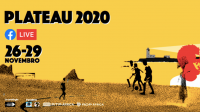 In the jury, we decided to use this year's excellent crop of films to award not only the awards traditionally bestowed by the festival but also a handful of special prizes and honourable mentions. For this, we offered the following official rationale, both on why we attributed the extra bling, but also on why we enthusiastically applauded this year's programming choices.
In the jury, we decided to use this year's excellent crop of films to award not only the awards traditionally bestowed by the festival but also a handful of special prizes and honourable mentions. For this, we offered the following official rationale, both on why we attributed the extra bling, but also on why we enthusiastically applauded this year's programming choices.
Afroscreen
01.12.2020 | by P.J. Marcellino
 Somewhere in between there is something more human that tries to understand these people, imagine if you had to flee your home and you could one carry one thing with you, how would you continue to be yourself? On top of fleeing and experiencing a traumatic conflict you turn up in a place that is supposed to be civilized and you get treated like an abomination. This project is about to try to humanize migrants and make them individuals and real people, our friends, our neighbors.
Somewhere in between there is something more human that tries to understand these people, imagine if you had to flee your home and you could one carry one thing with you, how would you continue to be yourself? On top of fleeing and experiencing a traumatic conflict you turn up in a place that is supposed to be civilized and you get treated like an abomination. This project is about to try to humanize migrants and make them individuals and real people, our friends, our neighbors.
Face to face
26.11.2020 | by Alícia Gaspar and Rachael Kiddey
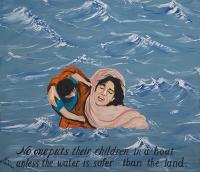 It has to do with the colonial history of Europe as a whole: I see this phenomenon of migration from the global south to the global north as the latest phase in the long history of racialized capitalism and colonialism. Many of these people who are trying to cross are coming from previously colonized countries by Europe. We know that, that long history of colonization has an impact in the present in terms of structural inequality, poverty, dispossession and war, and at the same time that we are seeing is the inability of Europe to come to terms with its own history. Which is a history of colonization, of course, instigated by proto-capitalism and capitalist developments as well as the hierarchy of racialization and the legacy of whiteness and white supremacy which fueled the whole colonial condition.
It has to do with the colonial history of Europe as a whole: I see this phenomenon of migration from the global south to the global north as the latest phase in the long history of racialized capitalism and colonialism. Many of these people who are trying to cross are coming from previously colonized countries by Europe. We know that, that long history of colonization has an impact in the present in terms of structural inequality, poverty, dispossession and war, and at the same time that we are seeing is the inability of Europe to come to terms with its own history. Which is a history of colonization, of course, instigated by proto-capitalism and capitalist developments as well as the hierarchy of racialization and the legacy of whiteness and white supremacy which fueled the whole colonial condition.
Face to face
25.11.2020 | by Alícia Gaspar and Yannis Hamilakis
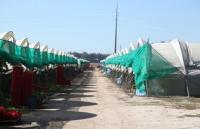 As night falls on São Teotónio, the lights are still on at the school. Three times a week, it stays open until midnight to hold classes for adults from the region, who come here at the end of a long day in the greenhouses – knowing they will need to speak some Portuguese in order to qualify for permanent residency. There are currently 500 adult students registered for night classes – almost matching the daytime intake of 600 children. Moldovan Vitali Siminionov, who picks flowers for a living, and whose two children both study at the school, joked: “They’re always correcting me saying ‘Dad, that’s not how you say it!”
As night falls on São Teotónio, the lights are still on at the school. Three times a week, it stays open until midnight to hold classes for adults from the region, who come here at the end of a long day in the greenhouses – knowing they will need to speak some Portuguese in order to qualify for permanent residency. There are currently 500 adult students registered for night classes – almost matching the daytime intake of 600 children. Moldovan Vitali Siminionov, who picks flowers for a living, and whose two children both study at the school, joked: “They’re always correcting me saying ‘Dad, that’s not how you say it!”
Games Without Borders
24.11.2020 | by Ana Naomi de Sousa
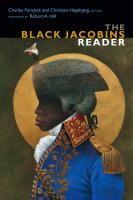 Stuart Hall once wrote that James in The Black Jacobins was the first to centre Atlantic slavery in world history – so in this sense the importance of James’s work to these debates is self-evident. Certainly, James’s short discussion on the economic roots of British parliamentary abolitionism formed the essential outline of Eric Williams’s more famous and lengthy contribution in this field – as Williams himself acknowledged, though in my opinion James’s grasp of the modernity of colonial slavery and the slave ships and plantations thanks to his underlying theoretical grasp of the uneven and combined nature of capitalist development meant his analysis of the exact relationship between capitalism and slavery is more sophisticated than that of Williams in many respects.
Stuart Hall once wrote that James in The Black Jacobins was the first to centre Atlantic slavery in world history – so in this sense the importance of James’s work to these debates is self-evident. Certainly, James’s short discussion on the economic roots of British parliamentary abolitionism formed the essential outline of Eric Williams’s more famous and lengthy contribution in this field – as Williams himself acknowledged, though in my opinion James’s grasp of the modernity of colonial slavery and the slave ships and plantations thanks to his underlying theoretical grasp of the uneven and combined nature of capitalist development meant his analysis of the exact relationship between capitalism and slavery is more sophisticated than that of Williams in many respects.
Face to face
18.11.2020 | by Christian Hogsbjerg, Charles Forsdick and The Public Archive
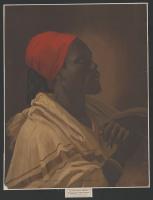 In Toussaint Louverture: A Black Jacobin in the Age of Revolutions (Pluto) Charles Forsdick and Christian Høgsbjerg have produced what is arguably the most important biography of Louverture since CLR James’ magisterial Black Jacobins was first published in 1938. Kicking against the contemporary anti-Black and anti-radical revisionism that downplays the historical importance of the revolution while dismissing the significance of Louverture himself, Forsdick and Hogsbjerg’s short monograph is urgent, timely, and strikingly well-written. They have also created a sort of supplement to the book, editing The Black Jacobins Reader (Duke), an excellent collection of essays, commentaries, and primary source material that provides additional context and critique for the writing, production, and circulations of James’ classic history.
In Toussaint Louverture: A Black Jacobin in the Age of Revolutions (Pluto) Charles Forsdick and Christian Høgsbjerg have produced what is arguably the most important biography of Louverture since CLR James’ magisterial Black Jacobins was first published in 1938. Kicking against the contemporary anti-Black and anti-radical revisionism that downplays the historical importance of the revolution while dismissing the significance of Louverture himself, Forsdick and Hogsbjerg’s short monograph is urgent, timely, and strikingly well-written. They have also created a sort of supplement to the book, editing The Black Jacobins Reader (Duke), an excellent collection of essays, commentaries, and primary source material that provides additional context and critique for the writing, production, and circulations of James’ classic history.
Face to face
18.11.2020 | by Charles Forsdick, Christian Hogsbjerg and The Public Archive
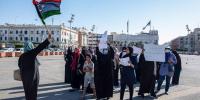 On March 23, at the outset of the pandemic, United Nations Secretary-General António Guterres called for a global ceasefire, in order to enable countries to focus on the COVID-19 crisis and allow humanitarian organizations to reach vulnerable populations. More than 100 women’s organizations from Iraq, Libya, Palestine, Syria, and Yemen quickly joined the appeal with a joint statement advocating a broad COVID-19 truce, which could form the basis for a lasting peace. It should come as no surprise that women were among the first to support the call for a ceasefire.
On March 23, at the outset of the pandemic, United Nations Secretary-General António Guterres called for a global ceasefire, in order to enable countries to focus on the COVID-19 crisis and allow humanitarian organizations to reach vulnerable populations. More than 100 women’s organizations from Iraq, Libya, Palestine, Syria, and Yemen quickly joined the appeal with a joint statement advocating a broad COVID-19 truce, which could form the basis for a lasting peace. It should come as no surprise that women were among the first to support the call for a ceasefire.
Games Without Borders
18.11.2020 | by Phumzile Mlambo-Ngcuka
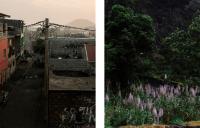 If images are powerful for identifying and revolutionising through the multiple interpretations they introduce into human feelings, then words identify through questioning, as they are connected to an idea of language as domination and authority – in other words, only those with social and political legitimacy write and speak.
If images are powerful for identifying and revolutionising through the multiple interpretations they introduce into human feelings, then words identify through questioning, as they are connected to an idea of language as domination and authority – in other words, only those with social and political legitimacy write and speak.
Afroscreen
15.11.2020 | by Marta Lança and Welket Bungué
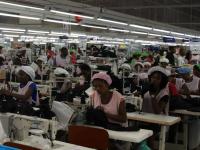 A Radical Journal of Geography, Global Displacements is a rigorous and trenchantly argued examination of the impact of the global organization of capitalist accumulation and exploitation on the life and labor of Haitian and Dominican people. Focusing on the garment industry, Werner looks at the circulation of capital and labor under neoliberalism, paying close attention to questions of geography, race, and gender. A critical, Caribbeanist intervention into geographic and political-economic research, Global Displacements will stand as a classic work of Caribbean studies.
A Radical Journal of Geography, Global Displacements is a rigorous and trenchantly argued examination of the impact of the global organization of capitalist accumulation and exploitation on the life and labor of Haitian and Dominican people. Focusing on the garment industry, Werner looks at the circulation of capital and labor under neoliberalism, paying close attention to questions of geography, race, and gender. A critical, Caribbeanist intervention into geographic and political-economic research, Global Displacements will stand as a classic work of Caribbean studies.
Games Without Borders
12.11.2020 | by The Public Archive and Marion Werner
 To celebrate the 45th anniversary of Angola's Independence, the ATD and GERAÇÃO 80 in collaboration with TPA, Mostra de Cinemas Africanos and PlatinaLine will be shown documentaries of the project "Angola - Nos Trilhos da Independência”, “Independence”, “Women of Arms”, “São Nicolau - They Haven't Forgotten” and “The Persistent Fragility of Memory”.
To celebrate the 45th anniversary of Angola's Independence, the ATD and GERAÇÃO 80 in collaboration with TPA, Mostra de Cinemas Africanos and PlatinaLine will be shown documentaries of the project "Angola - Nos Trilhos da Independência”, “Independence”, “Women of Arms”, “São Nicolau - They Haven't Forgotten” and “The Persistent Fragility of Memory”.
Afroscreen
11.11.2020 | by Geração 80
 As Black Lives Matter, we recognize and affirm the sanctity of all Black lives everywhere in the world. Following the murder of an unarmed civilian by the Special Anti-Robbery Squad (SARS) unit of the Nigerian police, young people across Nigeria have held protests denouncing years of brutality, torture, abductions, and killings. The demonstrations mark one of the largest Nigerian protest movements in generations. (...) There is a global movement for Black lives afoot. From the protestors in Cameroon who faced down water cannon and tear gas, to the fierce women in Namibia demanding #Shutitalldown, to the brave Zimbabweans campaigning for the release of Takudzwa Ngadziore, we will not be silenced and we cannot be stopped. The call for Black lives to matter is a rallying cry for all Black lives striving for liberation. We stand against all violence inflicted on black communities.
As Black Lives Matter, we recognize and affirm the sanctity of all Black lives everywhere in the world. Following the murder of an unarmed civilian by the Special Anti-Robbery Squad (SARS) unit of the Nigerian police, young people across Nigeria have held protests denouncing years of brutality, torture, abductions, and killings. The demonstrations mark one of the largest Nigerian protest movements in generations. (...) There is a global movement for Black lives afoot. From the protestors in Cameroon who faced down water cannon and tear gas, to the fierce women in Namibia demanding #Shutitalldown, to the brave Zimbabweans campaigning for the release of Takudzwa Ngadziore, we will not be silenced and we cannot be stopped. The call for Black lives to matter is a rallying cry for all Black lives striving for liberation. We stand against all violence inflicted on black communities.
To read
04.11.2020 | by BLM
 For 20 years, Fran Lebowitz has been dreaming of tourists disappearing from Times Square. “Now there are no tourists in Times Square,” she recently said, “but, of course, there’s no one in Times Square.” When the pandemic hit in March, Times Square went from a congested, and hellish, hub for tourists to an eerily empty dystopia. More recently, though, it has become a site of artistic expression, taken over by a free fall of protest art, colorful parades and performances. “It lacks the same history of worker organization spaces like Union Square, but with the spread of digital graphics and art during the Covid-19 pandemic and black-led uprisings, Times Square has made itself a unique site for protest in a city with more empty space, and an ongoing stream of creative mobilizations,” said Sarah J Seidman, a curator at the Museum of the City of New York.
For 20 years, Fran Lebowitz has been dreaming of tourists disappearing from Times Square. “Now there are no tourists in Times Square,” she recently said, “but, of course, there’s no one in Times Square.” When the pandemic hit in March, Times Square went from a congested, and hellish, hub for tourists to an eerily empty dystopia. More recently, though, it has become a site of artistic expression, taken over by a free fall of protest art, colorful parades and performances. “It lacks the same history of worker organization spaces like Union Square, but with the spread of digital graphics and art during the Covid-19 pandemic and black-led uprisings, Times Square has made itself a unique site for protest in a city with more empty space, and an ongoing stream of creative mobilizations,” said Sarah J Seidman, a curator at the Museum of the City of New York.
City
04.11.2020 | by Nadja Sayej
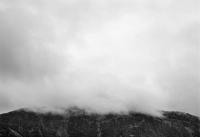 In 2010 Marta Lança set up the BUALA website, of which she is still the editor and the main driving force. To mark the 10th birthday of this unique platform dedicated to “exploring the synergies between art, theory, and activism in order to stimulate public debate about the lasting impact of racism and colonialism across Portuguese-speaking communities”, maat is hosting a special cycle of presentations, talks and screening entitled “and I am sparse in dense fluidity” – Gestures of Freedom”, curated by BUALA’s founder.
In 2010 Marta Lança set up the BUALA website, of which she is still the editor and the main driving force. To mark the 10th birthday of this unique platform dedicated to “exploring the synergies between art, theory, and activism in order to stimulate public debate about the lasting impact of racism and colonialism across Portuguese-speaking communities”, maat is hosting a special cycle of presentations, talks and screening entitled “and I am sparse in dense fluidity” – Gestures of Freedom”, curated by BUALA’s founder.
Face to face
30.10.2020 | by Nuno Ferreira de Carvalho and Marta Lança
 So what does being tropical mean? Being less concrete and assertive in our ideas and convictions? There’s certainly an art to filling the arid hours and empty nights here.
The bad news comes, here as everywhere, first thing in the morning. I retreat to the intimacy of my bookshelves and flick through a few tomes, while outside, the day quickly passes from fresh to mild to heat wave. It’s absurd to try and fit the news of someone’s death into the context of whatever story you have at hand, some false, pseudo-writerly notion of anguish. It’s as if a ghost has settled in between the lines and started hopping from noun to pronoun, though verbs would doubtless take it further.
So what does being tropical mean? Being less concrete and assertive in our ideas and convictions? There’s certainly an art to filling the arid hours and empty nights here.
The bad news comes, here as everywhere, first thing in the morning. I retreat to the intimacy of my bookshelves and flick through a few tomes, while outside, the day quickly passes from fresh to mild to heat wave. It’s absurd to try and fit the news of someone’s death into the context of whatever story you have at hand, some false, pseudo-writerly notion of anguish. It’s as if a ghost has settled in between the lines and started hopping from noun to pronoun, though verbs would doubtless take it further.
Mukanda
29.10.2020 | by Joaquim Arena
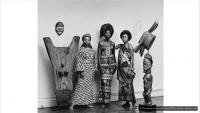 How a photographer, a group of models and a fashion show in Harlem kick-started a cultural and political movement that still inspires today. On 28 January 1962, a large crowd formed outside Purple Manor, a nightclub in the Harlem neighbourhood of New York City. A fashion show was taking place – an event that proved so popular it had to be held for a second time that same night – which sparked a movement that would change the way black people were represented forever. The show, titled Naturally ’62, was organised by the African Jazz-Art Society & Studios (AJASS), a group of creatives, including photographer Kwame Brathwaite.
How a photographer, a group of models and a fashion show in Harlem kick-started a cultural and political movement that still inspires today. On 28 January 1962, a large crowd formed outside Purple Manor, a nightclub in the Harlem neighbourhood of New York City. A fashion show was taking place – an event that proved so popular it had to be held for a second time that same night – which sparked a movement that would change the way black people were represented forever. The show, titled Naturally ’62, was organised by the African Jazz-Art Society & Studios (AJASS), a group of creatives, including photographer Kwame Brathwaite.
To read
28.10.2020 | by Precious Adesina